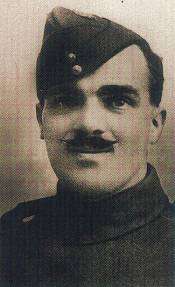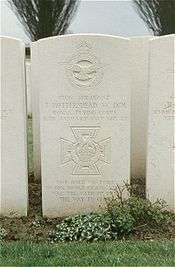Thomas Mottershead
| Thomas Mottershead | |
|---|---|
 | |
| Born |
17 January 1892 Widnes, Lancashire, England |
| Died |
12 January 1917 (aged 24) Bailleul, France |
| Buried at | Bailleul Communal Cemetery Extension |
| Allegiance |
|
| Service/branch | Royal Flying Corps |
| Years of service | 1914 - 1917 |
| Rank | Sergeant |
| Unit | No. 20 Squadron |
| Battles/wars | World War I |
| Awards |
Victoria Cross Distinguished Conduct Medal |

Thomas Mottershead VC, DCM (17 January 1892 – 12 January 1917) was an English recipient of the Victoria Cross, the highest and most prestigious award for gallantry in the face of the enemy that can be awarded to British and Commonwealth forces.
Background
Thomas Mottershead was born on 17 January 1892, one of a family of 10. Mottershead married Lilian Bree on 10 February 1914, and was working as a garage mechanic when World War I began. He enlisted in the Royal Flying Corps on 10 August 1914 as a mechanic,[1] Mottershead had studied engineering and had been apprenticed as a fitter working in Widnes. He was posted to the Central Flying school at Upavon and was promoted to Sergeant on 1 April 1916.[2]
In May 1916 he began pilot training[3] and in June of that year he obtained his Flying Certificate. He was posted to No.25 Squadron at St Omer, flying the FE 2, on 6 July 1916[4] and saw action in the Battle of the Somme.
Distinguished Conduct Medal
One of his first operations was low-level bombing raid on a German anti-aircraft battery which he successfully destroyed. On 22 September, with 2/Lt C. Street as observer he bombed the railway station at Samain, destroying one ammunition train and strafing another. While climbing away from the target, their aircraft was attacked by a Fokker scout. Accounts of the engagement indicate that it was Mottershead's skillful manoeuvring which enabled Street to shoot the enemy aircraft down.[5] For this action and other displays of gallantry, Sgt Mottershead was awarded the Distinguished Conduct Medal and promoted to the rank of Flight Sgt.
Undocumented accounts state that Mottershead and another No. 25 Squadron pilot landed on a German airfield, allowing their gunners to shoot up the hangars before taking off and escaping. The reputed date and location seem to remain unknown, but he was then transferred to No.20 Squadron at Clairmarais.
Victoria Cross
On 7 January 1917 near Ploegsteert Wood, Belgium, Sergeant Mottershead was on patrol in FE-2d (serial number A39) with observer Lt. W E Gower when he was engaged in combat by two Albatros D.III of Jasta 8. Lt Gower managed to hit one and put it out of the action, the second Albatros however, flown by German 'ace' Leutnant Walter Göttsch (20 victories),[6] hit Mottershead's aircraft, with the petrol tank pierced and the machine was set on fire. Enveloped in flames which his observer was unable to subdue with a handheld fire extinguisher, the Sergeant was badly burned but nevertheless managed to take his aircraft back to the Allied lines and made a successful forced landing. The undercarriage collapsed on touching the ground however, throwing the observer clear but pinning Thomas in his cockpit. He was subsequently rescued but died of his burns five days later.[7]
Mottershead received the only V.C. ever awarded to a non-commissioned RFC officer during the First World War.
Citation
For most conspicuous bravery, endurance and skill, when attacked at an altitude of 9,000 feet; the petrol tank was pierced and the machine set on fire. Enveloped in flames, which his Observer, Lt. Gower was unable to subdue, this very gallant soldier succeeded in bringing his aeroplane back to our lines, and though he made a successful landing, the machine collapsed on touching the ground, pinning him beneath wreckage from which he was subsequently rescued. Though suffering extreme torture from burns, Sgt. Mottershead showed the most conspicuous presence of mind in the careful selection of a landing place, and his wonderful endurance and fortitude undoubtedly saved the life of his Observer. He has since succumbed to his injuries.[8][9]

References
- Monuments to Courage (David Harvey, 1999)
- Pusher Aces of World War 1" Jon Guttman, Harry Dempsey. Osprey Pub Co, 2009. ISBN 1-84603-417-5, ISBN 978-1-84603-417-6.
- The Register of the Victoria Cross (This England, 1997)
- VCs of the First World War - Air VCs (P G Cooksley, 1999)
- http://simhq.com/forum/ubbthreads.php/topics/4098319/OT:_Airfield_Attack_-_The_Easy
Endnotes
- ↑ Pusher Aces of World War 1. p. 67.
- ↑ Pusher Aces of World War 1. p. 67.
- ↑ Pusher Aces of World War 1. p. 67.
- ↑ Pusher Aces of World War 1. p. 67.
- ↑ O'Connor, M. “Airfields & Airmen – Ypres”. Leo Cooper, 2001. p. 61 ISBN 0-85052-753-8
- ↑ Above The Lines; Franks Bailey & Guest, page 118
- ↑ Pusher Aces of World War 1. p. 68.
- ↑ The London Gazette: (Supplement) no. 29937. p. 1445. 9 February 1917. Retrieved 25 May 2015.
- ↑ CWGC entry